
MECCANICA
Scope & Guideline
Exploring the Frontiers of Condensed Matter and Mechanics
Introduction
Aims and Scopes
- Mechanics of Materials:
Research in this area includes the study of stress, strain, and deformation behaviors in various materials, particularly under complex loading conditions. It emphasizes the development of new materials and the analysis of their mechanical properties. - Fluid Dynamics and Thermodynamics:
This scope covers computational and experimental studies related to fluid flow, heat transfer, and thermodynamic processes. It includes the exploration of fluid-structure interactions and the impact of fluid dynamics on mechanical systems. - Robotics and Automation:
The journal features advancements in robotic systems, including modeling, control, and application of robotic mechanisms in various fields. Research often focuses on enhancing performance, reliability, and efficiency in robotic systems. - Vibration and Dynamics:
This area investigates the dynamic response of mechanical systems, including vibrations, stability, and control methods. It encompasses both theoretical and experimental approaches to understand and mitigate vibrational impacts. - Topology Optimization and Structural Mechanics:
Research under this theme involves the optimization of structures for weight reduction and performance enhancement, utilizing advanced computational methods to achieve efficient designs. - Numerical Methods and Computational Mechanics:
The journal publishes studies on the development and application of numerical techniques for solving complex engineering problems, including finite element analysis, computational fluid dynamics, and optimization algorithms. - Bio-inspired Engineering and Materials:
This unique contribution involves the application of biological principles in engineering design and materials science, focusing on innovations that mimic biological systems for improved performance.
Trending and Emerging
- Smart Materials and Structures:
Research in this area is rapidly growing, focusing on materials that can respond adaptively to environmental changes, enhancing the performance and functionality of engineering systems. - Computational Intelligence and Machine Learning in Engineering:
The integration of artificial intelligence and machine learning techniques into engineering design and analysis is on the rise, facilitating more efficient problem-solving and predictive modeling. - Sustainable Engineering Practices:
There is an increasing emphasis on sustainability and eco-friendly practices within mechanical engineering, reflecting a global shift towards reducing environmental impact and promoting resource efficiency. - Advanced Robotics and Autonomous Systems:
The development and application of advanced robotics, including collaborative robots and autonomous systems, are trending topics, driven by advancements in AI and sensor technologies. - Bio-mechanics and Medical Engineering:
Research at the intersection of mechanical engineering and biology, particularly in the context of medical devices and rehabilitation technologies, is emerging as a significant area of interest. - Multi-Physics Modeling and Simulation:
The trend towards integrating multiple physical phenomena in simulations is gaining traction, allowing for a more comprehensive understanding of complex engineering problems.
Declining or Waning
- Conventional Manufacturing Processes:
Research focusing on traditional manufacturing methods has diminished, as the field increasingly embraces advanced manufacturing techniques such as additive manufacturing and smart materials. - Static Structural Analysis:
While still relevant, the focus on purely static analyses is waning as dynamic and transient analyses become more critical in addressing real-world engineering problems. - Simple Mechanical Systems:
Studies centered on basic mechanical systems without complex interactions or advanced materials have seen a decline, as there is a growing emphasis on integrating multi-physics and complex system behaviors. - Classical Control Systems:
Research in conventional control theory is becoming less prominent, with a shift towards advanced control strategies that incorporate machine learning and adaptive systems. - Theoretical Mechanics without Practical Applications:
There is a noticeable reduction in purely theoretical studies that lack practical application, as the journal increasingly prioritizes research with clear implications for engineering practice.
Similar Journals

STROJNISKI VESTNIK-JOURNAL OF MECHANICAL ENGINEERING
Advancing Mechanical Engineering Knowledge Since 1974STROJNISKI VESTNIK-JOURNAL OF MECHANICAL ENGINEERING is a prestigious publication that has been disseminating cutting-edge research in the field of mechanical engineering since 1974. Published by the Association of Mechanical Engineers Technicians Slovenia, this journal serves as a critical platform for professionals, researchers, and students aiming to explore advancements in mechanical engineering and mechanics of materials. With a category ranking in the Q3 quartile for both Mechanical Engineering and Mechanics of Materials, the journal reflects a robust engagement with contemporary research and practices, contributing to the ongoing discourse within these vital disciplines. Although currently not open access, the journal is committed to providing high-quality, peer-reviewed articles that facilitate knowledge sharing and innovation. It is indexed in Scopus, maintaining respectable standings within its categories, thereby underlining its importance and impact in the global academic community.
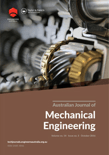
Australian Journal of Mechanical Engineering
Exploring Cutting-edge Developments in Mechanical Engineering.The Australian Journal of Mechanical Engineering is a distinguished publication in the realm of mechanical engineering, dedicated to advancing the knowledge and application of engineering principles within the industry. Published by TAYLOR & FRANCIS LTD in the United Kingdom, this journal has been integral to the field since its inception, featuring a range of peer-reviewed research articles, reviews, and technical notes that collectively aim to bridge theoretical research with practical applications. With an impressive Scopus ranking of #271 out of 672 in Mechanical Engineering, positioning it within the 59th percentile, the journal continues to uphold rigorous academic standards, currently occupying Q3 in the 2023 quartile rankings. Researchers, professionals, and students alike will benefit from its comprehensive coverage and insightful contributions, providing a vital platform for knowledge exchange and innovation in mechanical engineering.
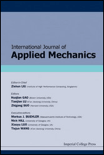
International Journal of Applied Mechanics
Driving Excellence in Mechanics of MaterialsThe International Journal of Applied Mechanics, published by World Scientific Publishing Co Pte Ltd, is a premier platform that serves the fields of materials science, mechanical engineering, and mechanics of materials. Located in Singapore, this journal has established itself as a crucial resource for researchers, professionals, and students, with its convergence of scholarly work from 2009 to 2024. Ranked in the Q2 category across notable disciplines, including Materials Science, Mechanical Engineering, and Mechanics of Materials, it reflects a strong commitment to publishing high-quality research that pushes the boundaries of knowledge in applied mechanics. Despite being a non-open access journal, its successful Scopus rankings, including an impressive rank of #151 in Mechanical Engineering, signify its substantial impact and recognition within the academic community. This journal not only aims to disseminate pioneering research but also to foster collaboration and innovation in the rapidly evolving landscape of applied mechanics.
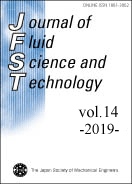
Journal of Fluid Science and Technology
Transforming Mechanical Engineering Through Fluid InsightsThe Journal of Fluid Science and Technology, published by the Japan Society of Mechanical Engineers, serves as a pivotal platform for the dissemination of cutting-edge research in the fields of fluid mechanics and mechanical engineering. With an ISSN of 1880-5558, this Open Access journal has been dedicated to advancing the understanding of fluid flow and transfer processes since its establishment. As of 2023, it holds a significant position with a Q3 quartile ranking in both Fluid Flow and Transfer Processes and Mechanical Engineering categories. Researchers and practitioners are encouraged to explore the journal’s extensive collection of articles, contributing to the body of knowledge that impacts various practical applications in engineering and technology. The journal, which has established a reputation for quality amidst a competitive landscape, further fosters international collaboration and education by providing unrestricted access to its content. For professionals and students alike, the Journal of Fluid Science and Technology represents an invaluable resource for the latest findings and innovations in fluid dynamics and mechanical systems.

Computational Particle Mechanics
Fostering Interdisciplinary Insights in Computational ScienceComputational Particle Mechanics, published by SPRINGER INTERNATIONAL PUBLISHING AG, is a leading journal dedicated to advancing knowledge in the interdisciplinary fields of computational mechanics, civil engineering, and fluid dynamics. With an impressive impact factor reflecting its high-quality research publications, this journal maintains a strong presence in the academic community with a Q1 ranking in categories such as Civil and Structural Engineering, Computational Mechanics, and Numerical Analysis as per the latest 2023 evaluations. Researchers and professionals benefit from the journal's commitment to open-access options, promoting wider dissemination of groundbreaking studies. Operating under the Swiss publishing house since 2014, Computational Particle Mechanics aims to foster innovation through the exploration of particle-based methods and simulations, making significant contributions to methodologies within computational mathematics and modeling. As the journal continues to evolve until its converged years end in 2024, it stands as a vital resource for those looking to enhance their expertise in dynamic modeling and simulation techniques.

ARCHIVES OF MECHANICS
Pioneering Research in Mechanical Engineering and Condensed MatterArchives of Mechanics, published by the Polish Academy of Sciences Institute of Fundamental Technological Research, is a distinguished open-access journal established in 1971 that has played a pivotal role in the dissemination of knowledge in the fields of Mechanical Engineering and Condensed Matter Physics. With its commitment to accessibility since adopting open access in 2022, this journal provides a platform for researchers, professionals, and students to share cutting-edge research findings and innovative methodologies. Although it currently holds a Q4 ranking in Condensed Matter Physics and a Q3 ranking in Mechanical Engineering for 2023, its comprehensive scope, which spans critical advancements in mechanical systems and materials science, positions it as a valuable resource for the academic community. Located in Warsaw, Poland, the journal continues to contribute significantly to the global discourse on mechanics and is dedicated to fostering new ideas that advance both theoretical and applied aspects of the discipline.

Journal of the Brazilian Society of Mechanical Sciences and Engineering
Bridging theory and application in engineering excellence.The Journal of the Brazilian Society of Mechanical Sciences and Engineering, published by Springer Heidelberg, is a pivotal platform dedicated to disseminating cutting-edge research in the realm of mechanical sciences and engineering. With an ISSN of 1678-5878 and an E-ISSN of 1806-3691, this journal showcases innovative findings across various categories, including Aerospace Engineering, Automotive Engineering, and Industrial and Manufacturing Engineering. Notably positioned in the Q2 and Q3 quartiles of its fields as of 2023, the journal highlights the importance of rigorous scientific inquiry, contributing significantly to the understanding and application of engineering principles globally. With a Scopus rank reflecting strong performance in multiple engineering disciplines, this journal serves as an invaluable resource for researchers, professionals, and students seeking to advance their knowledge and explore the frontiers of mechanical sciences. The journal covers a broad range of topics and aims to facilitate collaboration and synergy among experts in the field, enhancing the overall impact of mechanical engineering research.
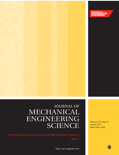
PROCEEDINGS OF THE INSTITUTION OF MECHANICAL ENGINEERS PART C-JOURNAL OF MECHANICAL ENGINEERING SCIENCE
Fostering collaboration and innovation in engineering disciplines.PROCEEDINGS OF THE INSTITUTION OF MECHANICAL ENGINEERS PART C - JOURNAL OF MECHANICAL ENGINEERING SCIENCE, published by SAGE Publications Ltd, stands as a pivotal resource in the field of mechanical engineering, encompassing a wide array of topics from advanced materials to fluid dynamics and system design. With an impact factor reflective of its esteemed reputation, as indicated by its Q2 ranking in the Mechanical Engineering category, this journal serves as a vital forum for researchers, practitioners, and students alike. The journal boasts a rich history, converging research from 1983 to 2024, showcasing innovations and advancements that shape the mechanical engineering landscape. Although it is not an open-access publication, the insights and studies published herein provide invaluable contributions to the engineering community, fostering knowledge exchange and collaborative advancements. Researchers seeking a platform for their pioneering work will find Part C an ideal venue to disseminate their findings and engage with peers in this dynamic field.

Moscow University Mechanics Bulletin
Championing Knowledge in Mechanical SciencesMoscow University Mechanics Bulletin, published by PLEIADES PUBLISHING INC, is a dedicated journal that has been influencing the fields of mechanical engineering and mechanics since its inception. With an ISSN of 0027-1330 and E-ISSN of 1934-8452, this journal serves as a crucial platform for advancing knowledge in mathematics, mechanical engineering, and mechanics of materials. Though currently indexed in the Q4 category across these disciplines, it offers a unique space for researchers and professionals to engage with emerging theories, experimental results, and practical applications. With a converged publication history spanning from 1973 to 1987, and continuing from 2007 to 2024, the journal remains relevant in today’s academic landscape. Though it operates under traditional access models, the journal's global reach aims to connect diverse voices in engineering research. Aspiring researchers and seasoned professionals alike will find valuable insights and a robust discourse that contribute to their respective fields.
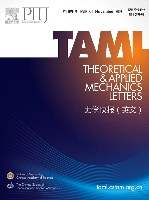
Theoretical and Applied Mechanics Letters
Connecting Theory and Application in Engineering ExcellenceTheoretical and Applied Mechanics Letters, published by ELSEVIER, stands as a premier journal in the field of engineering and applied mechanics, recognized for its rigorous peer-reviewed articles that advance theoretical and practical frameworks. With an impressive open access policy established in 2015, the journal enhances global accessibility to cutting-edge research across a range of disciplines including Aerospace, Civil, Mechanical, and Biomedical Engineering, along with Computational Mechanics and Ocean Engineering. The journal boasts an enviable position in the academic landscape, achieving a Q1 rank in several categories as of 2023, while being cited among the top percentiles in Scopus Ranks, specifically ranking #25 in Aerospace Engineering and #15 in Computational Mechanics. The journal aims to foster innovation by providing a platform for scholars and professionals to disseminate their findings, thereby bridging the gap between theoretical research and practical applications. By promoting a diverse range of topics and methodologies, Theoretical and Applied Mechanics Letters not only contributes to the advancement of engineering disciplines but also supports the global academic community in exploring sustainable and impactful engineering solutions.